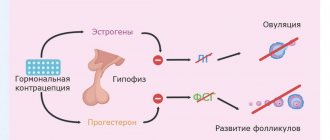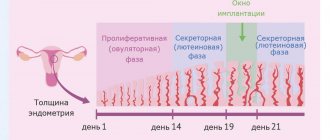Delayed menstruation, main reasons other than pregnancy
Normally, the menstrual cycle lasts from 21 to 35 days. For each woman, its duration is individual, but for most of them, the intervals between menstruation are equal or differ from each other by no more than 5 days. You should always mark the day your menstrual bleeding begins on your calendar so that you can spot cycle irregularities in time.
Often, after stress, illness, intense physical activity, or climate change, a woman experiences a slight delay in menstruation. In other cases, this sign indicates pregnancy or hormonal disorders. We will describe the main reasons for delayed periods and the mechanism of their development, and also talk about what to do in such a situation.
Amenorrhea
In the medical world, late or absent periods are called amenorrhea. It is divided into two categories:
- Primary amenorrhea. This is a condition in which a girl has not started her period by the age of 16. Often primary amenorrhea is associated with the presence of congenital disorders that did not manifest themselves in any way until the onset of puberty. These are, for example, genetic or chromosomal abnormalities, problems with the organs of the reproductive system, etc. These may include being born without a uterus, or a uterus that does not develop normally.
- Secondary amenorrhea. This is a condition in which periods suddenly stop and are absent for more than three months. Those. I used to have periods, but now they are absent. Secondary amenorrhea is the most common form of missed period. The most common causes of this condition are pregnancy, problems with the ovaries (for example, polycystic ovary syndrome or early menopause), pituitary tumors, stress, serious violations of normal body weight (both smaller and larger), and others.
In addition to amenorrhea, there is another medical term that I want to introduce you to - oligomenorrhea. This is a disorder in which the duration of the menstrual cycle significantly increases and the duration of menstruation itself decreases. It is generally accepted that a woman has oligomenorrhea if during the year she had periods less than 8 times and/or lasted up to 2 days or less.
What delay is considered normal?
Regular and constant menstruation in duration without significant blood loss or abnormal reduction in the volume of menstruation is a sign that the female body works without failures or disturbances, like a clock. Like frequent menstruation, constant delays in menstruation are a symptom of hormonal disorders, which also occurs with some gynecological and other diseases. However, any woman with a delay in menstruation first of all thinks about the most common cause of this phenomenon - possible pregnancy. Because of this, the fact is missed that such symptoms require consultation with a gynecologist and a thorough examination.
There are only three periods in a woman’s life during which delayed menstruation is normal. The first period is from the beginning of menstruation to 15-16 years, during the formation and maturation of the mechanisms of hormonal regulation of the menstrual cycle. Due to sharp fluctuations in hormone levels, significant delays in menstruation or even absence of menstruation for 1-2 months are acceptable.
Delayed menstruation during pregnancy is normal. Conception completely changes hormonal levels, “switching off” the menstrual cycle before childbirth. There is no menstruation during breastfeeding - this period is called postpartum amenorrhea, its duration can reach 1-3 years. In this way, the mother’s body eliminates unnecessary blood loss, and all the body’s resources are directed to feeding the child.
Menopause or perimenopause is also characterized by frequent delays or even periodic absence of menstruation for 1-2 months. The physiological decline of ovarian function and a decrease in the levels of female sex hormones gradually leads to the cessation of menstruation.
In all other cases, delayed menstruation is a sign of functional disorders of hormonal regulation of the menstrual cycle and/or illness.
Reasons for delayed menstruation other than pregnancy
A delay in menstruation can be the result of physiological changes in the body, as well as be a manifestation of functional failures or diseases of both the genital and other organs (“extragenital pathology”).
Normally, menstruation does not occur during pregnancy. After childbirth, the mother’s cycle is also not restored immediately; this largely depends on whether the woman is lactating. In women without pregnancy, an increase in cycle length may be a manifestation of perimenopause (menopause). Irregularity of the cycle in girls after the start of menstruation is also considered normal, if it is not accompanied by other disorders.
Functional disorders that can provoke disruption of the menstrual cycle are stress, intense physical activity, rapid weight loss, previous infection or other acute disease, climate change.
Often, an irregular cycle with a delay in menstruation occurs in patients suffering from gynecological diseases, primarily polycystic ovary syndrome. In addition, such a symptom can accompany inflammatory diseases of the reproductive organs, occur after termination of pregnancy or diagnostic curettage, after hysteroscopy. Ovarian dysfunction may be caused by pathology of the pituitary gland and other organs that regulate a woman’s hormonal levels.
Of the somatic diseases accompanied by possible menstrual irregularities, it is worth noting obesity.
Treatment of menstrual irregularities
Treatment is prescribed by a specialist depending on the reasons that led to this condition, and if we are talking about amenorrhea, then based on its type.
If we talk about the primary type of amenorrhea with undetected pathologies, then the patient is monitored and diagnosed. In addition, complexes of vitamins and minerals may be prescribed to maintain the general condition of the body; the doctor may advise you to protect yourself from stress, play sports, but not much physical activity, and adjust your diet and daily routine.
Most women feel their condition improves after losing weight. This can also be seen in the test results, and for many, the cycle returns after this adjustment to their lifestyle.
For secondary amenorrhea, one of the types of treatment or a combination of them will be prescribed:
- lifestyle changes - sufficient physical activity, a nutritious diet, sufficient sleep time, a normal psychological state have a great impact on the health of a woman’s hormonal system, so it is necessary to normalize your weight and lead a healthy lifestyle;
- treatment with medications – depending on the root cause of the disease, medications are prescribed based on the characteristics of the patient’s body;
- surgical intervention (in extreme cases, if the cause is a tumor, etc.).
Treatment usually lasts about six months. During this period of time, the patient’s hormonal levels may return to normal and menstruation may return. But we can talk about this if we fully comply with all the doctor’s requirements and lead a healthy lifestyle.
Which doctor should I contact?
If your menstrual cycle is irregular, you should first consult a gynecologist. Perhaps the woman is pregnant and the doctor will see this during a standard examination; in addition, she will take a smear test, which can reveal inflammation or infection that could lead to an irregular cycle. If the doctor does not find any pathologies, then it would be better to consult an endocrinologist, since the problem most likely lies in a hormone imbalance.
An experienced endocrinologist, candidate of medical sciences, Georgiy Nikitich Romanov, conducts paid online consultations with patients. This specialist worked for a long period of time in state medical institutions, was the head of the department, and teaches at the department of a medical university. Has the ability to study the medical history, prescribe and correctly interpret the results of the patient’s tests, on the basis of which a diagnosis will be made and the necessary treatment will be carried out. Romanov Georgy conducts medical practice, based on modern knowledge and treatment methods, and helps women eliminate menstrual irregularities.
You can contact a specialist in several instant messengers and social networks, he is almost constantly in touch with his patients, you can find out more here.
List of reasons that may cause a delay in menstruation
A delay of 2 to 5 days in the “red days of the calendar” should not be a cause for concern, since this is considered a very real phenomenon for every woman. If pregnancy is excluded, then such disorders of the female body can be caused by many factors. Their careful analysis allows us to determine the cause of a gynecological or non-gynecological nature.
So, we list the top 15 reasons for missed periods:
- Polycystic ovary syndrome;
- Uterine fibroids;
- Endometriosis;
- Inflammatory diseases;
- Hormonal contraceptives;
- Diagnosis of the uterine cavity, abortion or miscarriage;
- The period after childbirth;
- Puberty;
- Menopausal disorders;
- Great physical activity;
- Stressful conditions;
- Environmental climatic conditions;
- Body weight abnormalities;
- Intoxication of the body;
- Taking certain medications;
- Hereditary predisposition.
As follows from all of the above, the reasons for regularly recurring delays of critical days are multifaceted. Biological clocks can go wrong even in nulliparous women, who often confuse the symptoms of menstrual irregularities with pregnancy. An inconsistent menstrual cycle should not be considered a particularly dangerous, serious illness, but it is still worth paying close attention to the frequency of your critical days.
Stress and physical activity
The most common causes of missed periods, besides pregnancy, are various nervous tensions, stress, and the like. Difficult work environment, exams, family problems - all this can cause a delay. A woman’s body perceives stress as a difficult life situation in which a woman should not give birth yet. It is worth taking care of changing the situation: contact a family psychologist, change jobs, or learn to relate to the situation more simply, and the like. Keep in mind that overwork and lack of sleep are also very stressful for the body.
Excessive exercise also does not contribute to the regularity of the menstrual cycle. It is known that professional athletes often experience problems with delayed periods and even with childbearing. The same problems plague women who take on physically demanding jobs. It's better left to men.
But don’t think that moderate exercise or morning jogging can affect the situation. An active lifestyle has never bothered anyone. We are talking specifically about excessive loads under which the body works for wear and tear.
Weight problems
Scientists have long found out that adipose tissue is directly involved in all hormonal processes. In this regard, it is easy to understand that the reasons for a delay in menstruation, in addition to pregnancy, may also lie in weight problems. Moreover, both excess and lack of weight can provoke a delay.
If you are overweight, the fat layer will accumulate estrogen, which negatively affects the regularity of your cycle. With underweight, everything is much more complicated. Prolonged fasting, as well as weight loss below 45 kg, is perceived by the body as an extreme situation. Survival mode turns on, and in this state pregnancy is highly undesirable. In this case, not only a delay in menstruation is possible, but also its complete absence - amenorrhea. Naturally, problems with menstruation disappear with normalization of weight.
That is, plump women need to lose weight, thin women need to gain weight. The main thing is that this must be done extremely carefully. A woman’s diet should be balanced: the food should contain proteins, fats, carbohydrates, as well as vitamins and microelements. Any diet should be moderate and not debilitating. It is better to combine them with moderate physical activity.
Inflammatory diseases of the uterus
Inflammatory diseases of the uterus and ovaries lead to disruption of the production of hormones that are responsible for the processes of maturation of eggs, follicles, and endometrium. As a result, they are often the cause of delay. At the same time, the volume and nature of the discharge changes, pain appears in the lower abdomen, lower back, and other symptoms.
Often, inflammatory processes are the cause of infertility, tumors of the reproductive system, and mammary glands. Inflammatory diseases occur due to infection due to improper hygienic care of the genitals, unprotected sexual intercourse, traumatic damage to the uterus during childbirth, abortion, and curettage.
Brown discharge during ectopic pregnancy
The implantation of the embryo occurs from the third to the seventh day after the rupture of the follicle. If it is attached already on the first or second day, there is a possibility of an ectopic pregnancy, which cannot be carried to term. And then urgent medical attention is needed, otherwise you may lose the opportunity to have children in the future, and there is a risk of death. These signs can help identify an ectopic pregnancy:
- pain in the abdominal area;
- weakly positive test result;
- Ultrasound does not demonstrate the presence of a fetal egg in the uterus;
- HCG in the blood is increased;
- bleeding from the vagina occurs;
- blood pressure is below normal;
- my head is spinning.
In particularly severe cases, you may even lose consciousness due to severe blood loss.
Birth control pills
If you are taking hormonal birth control pills, it is possible that your menstrual cycle will be significantly different from normal. Very often, the duration of cycles when taking birth control pills increases significantly. Some pills do not have this effect. Menstruation occurs as usual, but most often it is lighter and shorter. It is also worth noting that in very rare cases the pill may not prevent pregnancy, especially if it is missed. However, even if you took the pills accurately and correctly, if your period is late and you are worried about it, you can take a pregnancy test to calm down.
Nowadays you can find a fairly large number of different birth control pills on sale. Some of them may differ significantly in their effects on the body. In addition, it is worth noting that each individual woman can react differently to the same pills.
Also, keep in mind that when you stop using birth control pills, you may not have a normal menstrual cycle right away. For most women, the recovery period takes from one to two months, and sometimes this period can last up to six months. Only then will you be able to conceive a child again. Accordingly, during the recovery period you may also have an irregular cycle, and this must be taken into account if you have a delay.
Delayed menstruation during pregnancy and after childbirth
During the entire period of pregnancy, a woman does not have periods. After childbirth, their resumption occurs in different ways - it all depends on the individual characteristics of the body. Elevated prolactin levels when breastfeeding can prevent eggs from starting to function. If a woman is breastfeeding, a delay in menstruation may last as long as milk is produced (this directly depends on the level of the hormone prolactin, which is responsible for lactation). Sometimes this can happen within 2-3 years.
If milk is not produced, another period will occur in about 6-8 weeks. But sometimes there are exceptions when the ovaries begin to work even before the baby stops feeding, the egg matures, and the woman can become pregnant again. If this does not happen, the new cycle ends with the appearance of menstruation.
Why are constant delays in menstruation dangerous?
Constant delays in menstruation indicate hormonal disorders, lack of ovulation, and abnormal changes in the structure of the endometrium. Pathology can arise due to serious, even dangerous diseases: tumors of the uterus, endocrine glands, polycystic ovaries. The cause of a missed period is an ectopic pregnancy.
It is necessary to establish a diagnosis as early as possible, to find out the degree of danger of the processes, since they lead, at a minimum, to infertility and early menopause. Diseases associated with delayed menstruation cause breast tumors, cardiovascular problems, diabetes, weakened immunity, premature aging, and changes in appearance. For example, if the delay occurs due to polycystic ovary syndrome, then the woman experiences a sharp increase in weight, up to obesity, hair appears on the face and chest (as in men), acne, and seborrhea.
Timely treatment of diseases that cause prolongation of the cycle often helps to avoid infertility, ectopic pregnancy, miscarriage, and prevent the appearance of cancer.
Additional symptoms
A missed period is especially dangerous if it is accompanied by other unpleasant symptoms. This may include nausea, vomiting, decreased libido, and pain in the mammary glands. Such signs, first of all, may indicate pregnancy. But they also often indicate the development of a corpus luteum cyst and the occurrence of hormonal imbalance.
Other common additional symptoms of delayed menstruation:
- Weight change.
- Nagging pain in the lower abdomen.
As a rule, signs of approaching menstruation with a delay are manifested by cramps in the abdomen and the appearance of defects on the skin, most often in the form of acne. Weakness, headaches and intestinal problems may also occur.
Examinations for delayed menstruation
To find out the reasons for the delay in menstruation, the following studies are prescribed:
- Examination for sexually transmitted diseases (gonorrhea, chlamydia, trichomoniasis, mycoplasmosis, ureaplasmosis, etc.).
- Ultrasound of the pelvic organs, thyroid gland and adrenal glands. This study is carried out to exclude pregnancy, tumors, gynecological and endocrine diseases.
- Examination of the pituitary gland (radiography, magnetic resonance imaging, computed tomography, electroencephalography). Diseases of the pituitary gland are quite often the cause of delayed menstruation.
- Hormonal studies. The levels of estrogen, progesterone, FSH, LH, PRL are determined, as well as thyroid and adrenal hormones.
- Curettage of the inner layer of the uterus and its further histological examination. Curettage is performed from the cavity and canal of the cervix.
Uterine erosion and spotting
If a pregnant woman has cervical erosion, a woman may occasionally experience slight vaginal discharge. The reason is that the eroded area is irritated and damaged during the growth of the uterus and stretching of the cervical canal. In this case, it is also recommended to be observed by a specialist.
In case of erosion, spotting may occur even in the absence of pregnancy. For example, it is often caused by mechanical trauma during sexual intercourse or during examination by a doctor. And if it appears due to inflammation of the endometrium, you will find brown discharge before the start of your period.
What to do if your period is late?
If you experience regularly recurring delays in menstruation or the period of delay exceeds the maximum permissible physiological limits of five days, you should consult a doctor. After determining the reasons, the woman will be prescribed appropriate treatment. Most often, therapy is carried out using hormonal pills. However, under no circumstances should they be taken independently, without medical advice. This is extremely dangerous for a woman’s health and can disrupt the entire hormonal system, which means it can lead to serious health problems.
Among the most common hormonal drugs, doctors prescribe the following:
- Duphaston. Used if a delay in the menstrual cycle is caused by insufficient levels of progesterone in the body. Only a doctor should adjust the dose based on the research conducted. If there is no pregnancy and the delay does not exceed 7 days, then postinor is prescribed for a period of 5 days. After this time, menstruation should begin two or three days later.
- Postinor. It is a drug used for emergency contraception. This remedy is used if it is necessary to induce a menstrual cycle as quickly as possible. However, it is recommended only for regular menstruation, since its use can provoke cycle disorders, and if used very frequently, lead to infertility.
- Pulsatilla. Another hormonal drug that can be prescribed for delayed menstruation. This is the safest remedy that does not lead to weight gain and does not affect the nervous system. However, it should not be taken by girls with irregular cycles.
- Progesterone is an injectable hormone. Used to induce menstruation, dosage selection is carried out strictly individually. An increased intake of progesterone in the body can cause a lot of side effects, including excess hair growth, weight gain, and menstrual irregularities. More than 10 injections are never given. The effect is based on stimulating the work of the glands located in the mucous membrane of the uterus. The drug has a number of contraindications, including: uterine bleeding, liver failure, breast tumors, etc.
- Non-ovlon, a drug that stimulates the onset of the menstrual cycle, can prevent acyclic bleeding. It contains estrogen and gestagen. Most often, if there is a delay, two tablets are prescribed every 12 hours. However, before using it, it is mandatory to consult a specialist, since the drug has side effects and can disrupt the functioning of the reproductive organs.
- Utrozhestan. It is a drug that suppresses estrogen and stimulates the production of progesterone, which determines its therapeutic effect. In addition, it has a stimulating effect on the development of the endometrium. The drug can be administered vaginally, which is its undoubted advantage, however, this drug also has some contraindications.
- Norkolut causes menstruation because it contains norethisterone, which is similar in action to the action of gestagens. And their lack often provokes failures in cycles and their delay. The course of treatment should not exceed five days; it is not used during pregnancy, as it risks miscarriage and bleeding. It has a large number of contraindications and side effects, so a preliminary consultation with a doctor is necessary.
Naturally, the use of hormonal drugs to induce menstruation is not a safe method. They must be taken correctly, as they can cause irreparable harm to health.
Symptomatic therapy
If you have scanty periods caused by physiological reasons, treatment is not required. When hypomenorrhea is associated with lifestyle features (poor nutrition, intense training, stress), in most cases it is enough to adjust the diet, reduce sports activity, and increase rest to restore the cycle. It is useful to take multivitamin complexes, and for emotional experiences, light sedative herbal medicines. For other patients, treatment, especially with the use of hormonal agents, is prescribed only after a diagnosis has been established.









